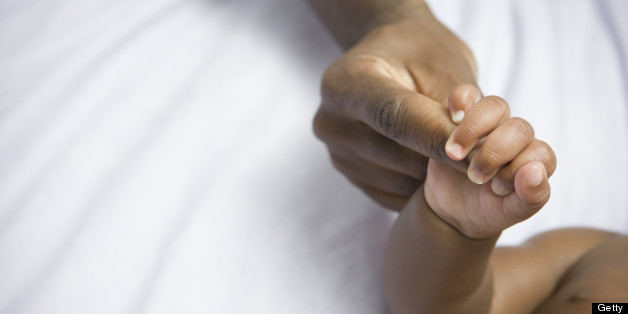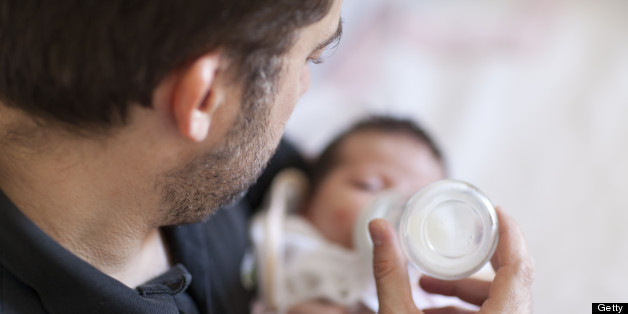
When you're expecting, you likely spend a lot of time thinking about the baby -- and what will happen after he or she arrives. There are strollers to buy! Prenatal vitamins to pop! Birth plans to devise! But sex -- the having of it (or not) during pregnancy and beyond -- is one of those things that's trickier to prepare for.
And let's face it ... things change. Body parts go wonky; emotions go haywire -- and that's all before sleep deprivation kicks in. Even the most sexually confident woman might wonder: This thing that's happening here, is that normal? And there's not much guidance. "A lot of couples have a lot of questions about sex," agreed Dr. Lauren Streicher, an associate professor of obstetrics and gynecology at Northwestern University and author of the forthcoming Love Sex Again. "And doctors aren't bringing it up."
Which is why Streicher and several other notables in the sexual health arena agreed to share a few of the very common things that happen during pregnant sex and sex after childbirth. What's on your list?
DURING PREGNANCY:
1. You Might Be Really Horny ...

During the second trimester, many women experience a surge of hormones (including testosterone), which can significantly boost their sex drive, said Rose Hartzell, a certified sex therapist with San Diego Sexual Medicine. (Add in the overwhelming relief that accompanies the end of morning sickness.) At the same time, it's not uncommon for a woman's partner to report being particularly turned on by her body -- namely, her growing breasts -- said Streicher. And that could lead to an overall boost in couple-wide randiness, if you will.
2. ... Or not.
"I find that there are usually two camps: women who find that they have heightened sexuality during pregnancy, and those who feel just completely asexual," said Streicher. Hartzell agreed, saying that media outlets tend to oversell the horny story and under-report the "um, no thanks" response to pregnant sex, leaving some women feeling inadequate when it comes to their sexual appetites. But both are totally common reactions to pregnancy, the experts say, as are serious libidinal fluctuations throughout.
3. Your Breasts Might Leak.
"If your partner is handling your breasts and nipples, sometimes that's going to cause a little bit of fluid to come out, which can kind of freak people out if they're not expecting it," said Streicher. It typically begins in the second trimester, she explained, adding that it can be difficult for a woman's partner to adjust to the idea that her breasts are not simply there for sexual pleasure. And the potential freak-out quotient can have not-so-great consequences for a couples' sexual satisfaction. "A lot of women really depend on breast stimulation to get aroused, so when someone is backing off on that, it can have an impact on their pleasure," Streicher said.
4. You Might Have Really Intense Orgasms ...

"Orgasms can be more pleasurable during pregnancy," explained Stephanie Buehler, a psychologist and sex therapist who runs The Buehler Institute. "There is increased blood flow to the genitals. Also, the pregnant woman produces more of certain hormones, like oxytocin, that can make orgasms especially intense." And evidence suggests that the oxytocin (the so-called love hormone) can cross the placental barrier to your baby, Hartzell said. Good news for you and your baby!
5. ... And Be Forced To Think Outside Of The Box.
As pregnancy progresses and women's bodies change, many once beloved sexual positions are no longer comfortable ... or even feasible. "A lot of parents realize that their typical sex positions are going to have to change, but until it happens, I don't think they realize what a big transition it is," said Hartzell. Think of it as a good time to get creative and experiment with different positions (side-by-side is often a good option), props or other means of giving and receiving sexual pleasure, such as oral sex, massages or just plain kissing, she said.
AFTER CHILDBIRTH:
1. You Might Do Non-Intercourse Stuff First.
A 2012 study that looked at mothers' desire postpartum found that women tended to perform oral sex on their partners or masturbate before they were ready to have intercourse or receive oral sex themselves. Indeed, roughly 40 percent of women reported they masturbated within the first few weeks of having a baby. By the end of the first three months, 85 percent said they'd started having intercourse again, but Streicher said data suggests that many women don't totally enjoy it right away. Thus, the "you're good to go after six weeks" advice that most doctors give to couples after a vaginal birth or C-section simply isn't realistic -- or all that helpful, she said.
2. You Could Feel 'Touched Out.'

This phenomenon can certainly happen to both partners, but Buehler said it's particularly common for women to report feeling "touched out" after caring for a newborn. "Cuddling, breastfeeding, rocking and even changing the baby take a lot of hands-on care," she said. Buehler advised that taking a break for a solo cup of tea or bath can help make whichever partner is feeling kind of "meh" about contact feel more receptive to their partner's touch.
3. You Might Be Dry ...
"I'd say the number one thing women don't expect is vaginal dryness," said Streicher, adding that it may cause pain during sexual activity. The dryness, she explained, results from a lack of estrogen, particularly among women who breastfeed. A good lubricant can help, but if the dryness persists, Streicher suggests talking to your health care provider about your options.
4. ... But Also Have Leakage Issues.
Another change for which Streicher believes women are woefully unprepared is the incontinence that can occur after childbirth. "It's not unusual at all ... and women also tend to have a loss of urine with sexual activity," she said. "Most women haven't been told about it, and they don't know if it will go away." For many women, urine leakage (during sex or otherwise) does indeed go away on its own, usually within a matter of weeks or months, she said; for others, pelvic floor physical therapy may be necessary, or they might benefit from using an at-home kegel exerciser device.
5. Partners Might Experience Changes, Too.

It seems just a tad obvious, but studies are only just beginning to show that having a child affects partners' sexual desire, as well. An August study that focused on heterosexual couples in committed relationships found that men also experience highs and lows in terms of sexual desire, post-baby (and lows were often a result of the usual suspects: fatigue, stress and lack of time). Hartzell put it simply: "It's going to be different than it was before the baby arrives."
6. The Negative Stuff Won't Last Forever.
Which is not to imply that all new mothers or partners experience a dip in post-childbirth sexual desire or activity -- they don't. And a recent study suggests that any potential issues aren't long-lasting. Researchers with the University of California San Francisco found that two years after childbirth, there was no notable link between having a baby and subsequent low desire, sub-monthly sexual activity or low overall sexual satisfaction.
In other words, this too shall pass.
Expecting? Use our pregnancy week-by-week calendar to find out what's happening with baby now!
